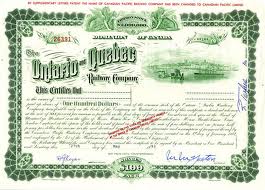|
Page 1 of 3  Do you hold some of your investments at home (or perhaps in a bank safety deposit box) in the form of traditional certificates in paper form? Can't remember where they are? You may already be generally aware that there are probably better ways of holding them. The best known one, which we describe in this commentary, is dealing with your broker (in which event you will end up having them held on your behalf by your broker in so-called street form). If you do not have a broker, or prefer not to have your broker hold the certificates on your behalf, a second alternative is available in many cases called DRS for direct registration system. We will describe the DRS route in the next commentary in this series. Do you hold some of your investments at home (or perhaps in a bank safety deposit box) in the form of traditional certificates in paper form? Can't remember where they are? You may already be generally aware that there are probably better ways of holding them. The best known one, which we describe in this commentary, is dealing with your broker (in which event you will end up having them held on your behalf by your broker in so-called street form). If you do not have a broker, or prefer not to have your broker hold the certificates on your behalf, a second alternative is available in many cases called DRS for direct registration system. We will describe the DRS route in the next commentary in this series.
Some basics
Before getting into the subject, here are some must-do suggestions:
- Know where you have left your certificates (if not in a secure place, take remedial action)
- Make sure you have a list (elsewhere, not with the actual certificates) of all your certificates - by
 issuer, type (common, preferred etc.), quantity issuer, type (common, preferred etc.), quantity
- Note the certificate numbers
- Note the exact name in which they are registered
- Confirm they are NOT endorsed in blank on the back (if not, take immediate action- this is like leaving cash lying around)
Ok, now let's begin,
First,
are they even worth anything?
Securities listed on
a stock exchange or other trading markets are generally worth more or less the
price at which they are currently trading.
Old share
certificates, for example those you find when rummaging through your deceased
aunt’s attic, are another matter. They may have no value, for instance because
the issuer went bust long ago. On the other hand, they may have been renamed as
a result of a name change or because their issuer went through a merger or
other corporate transaction, but still remain valuable.
If you are having
trouble figuring out their value, a good first step is to open a brokerage
account and deposit the certificates. The broker will run the CUSIP number
which appears on the face of the certificate and figure out if they belong to a
renamed/merged  company, whether they have split or conglomerated, and if
they're still traded. company, whether they have split or conglomerated, and if
they're still traded.
If the broker cannot
find the answer, or if you prefer researching yourself through other means,
here are various sources which you can consult:
General:
Canadian source:
US sources :
In the remainder of this
commentary we will assume your certificates do have financial value.
<< Start < Prev 1 2 3 Next > End >>
|